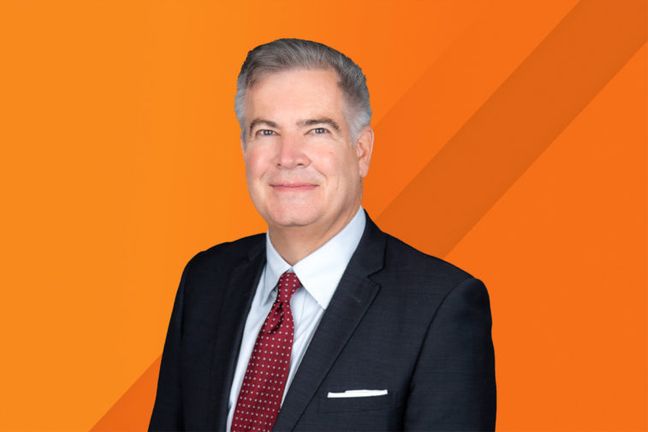Please allow us to introduce Charles Reynolds, the Managing Partner of Tyson & Mendes’ Tampa office. Charles joined the firm in June, bringing with him more than 30 years of experience defending clients in matters relating to products and premises liability, construction defects, medical malpractice, and toxic torts. Charles is a veteran of the United States Air Force and is one of only two attorneys appointed by The Florida Bar to sit on the Supreme Court Judicial Ethics Committee. Learn more about this experienced litigator, actor, and amateur carpenter below.
T&M: Tell us about your legal background and how you got into the insurance defense industry?
CR: I have been a military judge advocate, an assistant U.S. attorney, a corporate legal officer, and a civil arbitrator, but the vast majority of my career has been spent as an insurance defense attorney, which happened (as is often the case) because a law school classmate encouraged me to apply to a small defense firm that I stayed with for 25 years.
T&M: What drew you to Tyson & Mendes?
CR: I was drawn by the chance to open and grow an office in my home area and the firm’s complete dedication to the insurance industry and self-insured companies.
T&M: Compared to other firms you have worked for, what makes Tyson & Mendes so unique?
CR: Because I have always worked at the home office of my law firms, much is unique in terms of working with all my colleagues remotely. This includes adjusting to West Coast time. It is also unique in my experience that we have such focused support staff with teams of people who have one area to manage rather than several people wearing many hats. This really helps resolve issues quicker than other firms in which I have worked.
T&M: What do you hope to achieve as Managing Partner of the Tampa office?
CR: Hopefully, this office will grow and become a significant contributor to the firm overall.
T&M: What has been your most significant or challenging case to date?
CR: The most challenging case I have had involved a product that allegedly killed a physician. The police and many of my experts suspected it was actually a murder committed by her husband but there was simply not enough proof to convince the carrier, and several excess carriers, that we could prevail, and it was settled. I still think about that case.
T&M: What advice would you give to aspiring or young lawyers?
CR: Nonbillable time is not your enemy. It is a long-term investment. It is hard to see sometimes but dividends are paid years down the road with every article you write, contact you make, or event you attend. You just need to have some patience which is often in short supply today.
T&M: If you weren’t a lawyer, what would you be?
CR: An actor. I still do a few things locally when it works with my schedule, but regardless of if its theater, film, or television, I benefit from being around people who are usually very different from me. As you might imagine, most working actors have various and temporary jobs and seem astounded that I get up and go to the same job every day!
T&M: If you could have dinner with any historical legal figure, who would it be and why?
CR: Robert Jackson was the lead American prosecutor at Nuremberg. I would ask him what it was like going after some of the worst war criminals in modern history. How did he deal with the Soviets and what was behind some of the sentencing of those who faced prison rather than the gallows?
T&M: Any shows or podcasts you are watching/listening to that you would recommend?
CR: Like most everyone, I binged about 100 different shows over the last two years. I tend to like shows with historical context, but I really enjoyed Ozark for its constant tension. There was also a series called The Alienist that I thought was pretty enthralling about 19th century detectives in New York.
T&M: Where can we find you on the weekends?
CR: Most likely at my garage workbench. I make some really rudimentary furniture for friends and family that is not very good, but it is free!

 Featured: Charles Reynolds
Featured: Charles Reynolds
 Cannabis Workers Allege Quota to Trim 4 Pounds a Day Violates the California Labor Code
Cannabis Workers Allege Quota to Trim 4 Pounds a Day Violates the California Labor Code
 The Ninth Circuit Reminds Us: Every Word Matters
The Ninth Circuit Reminds Us: Every Word Matters
 NO WAY, PRO SE! The Consequences of Abusing the Judicial System as a Pro Se Litigant in Colorado
NO WAY, PRO SE! The Consequences of Abusing the Judicial System as a Pro Se Litigant in Colorado
 Victim of Financial Mismanagement or Unlawful Retaliation? New Jersey City University Program Founder Claims School Retaliated After Reporting Alleged Sexual Harassment
Victim of Financial Mismanagement or Unlawful Retaliation? New Jersey City University Program Founder Claims School Retaliated After Reporting Alleged Sexual Harassment
 “Real Housewives” Gets a Reality Check
“Real Housewives” Gets a Reality Check
 Missing a Chapter: Insufficiency of Expert Deposition Testimony in Medical Malpractice Litigation
Missing a Chapter: Insufficiency of Expert Deposition Testimony in Medical Malpractice Litigation
 Crash Course: Why Summary Judgment Misses the Mark in Illinois Multi-Cause Limousine Crash Collision
Crash Course: Why Summary Judgment Misses the Mark in Illinois Multi-Cause Limousine Crash Collision
 Bitter Truths: Lead, Cadmium, and Defective Pleadings in California Chocolate Class Action
Bitter Truths: Lead, Cadmium, and Defective Pleadings in California Chocolate Class Action
 The Law of Unintended Consequences: Including Insurance Brokers in Litigation Strategy Communication May Waive the Attorney-Client Privilege
The Law of Unintended Consequences: Including Insurance Brokers in Litigation Strategy Communication May Waive the Attorney-Client Privilege